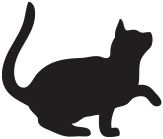What is Feline Mammary Hyperplasia?
Feline mammary hyperplasia is an unusual but benign condition that can be confused with mammary cancer in cats. This condition tends to occur in young cats, even kittens. Literally overnight, the cats mammary glands can become very swollen. The condition is is caused by exposure to the hormone progesterone, which may be produced naturally during the cats reproductive cycle or may be given to treat certain diseases. The glands can ulcerate from the drastic swelling…
Monitoring zoonotic diseases in cats
Monitoring zoonotic diseases According to an article in Science Daily, most new infectious diseases in humans come from animals - including companion animals. However, international agencies currently monitor only diseases transmitted from livestock to people, such as swine flu and avian flu. The study was led by Michael Day, a veterinary pathology professor at the University of Bristol in the U.K. …
Gardens Made Just for Cats
You may still be shoveling snow off the walk, or cuddling near the fireplace soon after the sun goes down. But spring is just around the corner, and now is a good time to think about your warm weather goals while you still have some time to plan. For instance, maybe youre thinking about how to enhance your outdoor environment for your pets, or considering growing some indoor herbs that are fragrant and cat-friendly. …
Some Popular Cat-Safe Grasses and Herbs
It is important to know which plants are safe for cats and which ones are not. Fortunately, there is a long list of safe grasses and herbs that can provide your cat lots of enjoyment (see sidebar on page 13 for information on plants that are dangerous to pets). The popular grasses and herbs include: …
Feline Gastritis
Cats are notoriously finicky eaters, so it might surprise you to learn that stomach upsets are actually quite commonplace. But just a few bites of spoiled food or a mild infection can cause stomach distress - known as gastritis - and trigger a trip to the veterinary clinic, according to Mary Labato, DVM, veterinary internal medicine specialist and Clinical Professor at Cummings School of Veterinary Medicine at Tufts University. …
What is Polycystic Kidney Disease?
Polycystic kidney disease (PKD) is a slowly progressive and inherited kidney disorder that affects Persian and Persian-related breeds, and it is the most prevalent inherited genetic disease in cats. The prevalence of PKD varies by country, ranging from 36 percent (Slovenia) to 49.2 percent (United Kingdom). In the United States, 38 percent of Persian and Persian-related cats have the condition. …
Feline Disorders of the Esophagus
Megaesophagus is a condition in which the esophagus is weak and unable to propel food from the mouth to the stomach. The esophagus becomes flaccid and large (hence the mega,derived from Greek, meaning large). There are several causes of megaesophagus in the cat, such as congenital and hereditary disorders (Siamese cats are predisposed) and neuromuscular disorders (such as dysautonomia and myasthenia gravis).
Dear Doctor – August 2015
Pet food and expiration dates QI recently bought several large bags of a high-quality cat food on sale at our local pet store. Unfortunately, I just realized that the best by date passed by a couple of weeks ago on two of the bags (the third bags date is okay). Should I now consider this food to be unsafe and throw it away? …
Renomegaly: What You Should Know
Apparently, Im not the only veterinarian who has noticed that certain veterinary cases tend to come in twos and threes. Months or even years can elapse without my seeing a particular ailment, and then Ill get two in the same week - sometimes even in the same day. I recently examined a 12-year-old cat who displayed decreased appetite and weight loss. From the cats scrawny appearance on the exam table, it was obvious that he had…
Beware: Misleading Number of Calories in Some Weight Loss Cat Foods
Believe it or not, you can find at least 50 cat foods on the market with promises on their labels that claim everything from weight loss to reduced calorie to weight management. But just what do these phrases mean? Unfortunately, they can mean whatever the manufacturer wants them to. …
How Feline General Anesthesia Works
General anesthesia that employs intubation is typically used for more prolonged surgical procedures. The following steps are involved: - On the day prior to surgery, the patient is given a thorough physical exam and undergoes a blood test to determine, above all, that she is not anemic and that her organs will function properly once her brain has been anesthetized. (If you have a young cat, says Dr. Blaze, theres not a lot you have to…
All About Anesthesia for Cats
Virtually all feline surgical procedures - whether brief and relatively simple or lengthy and complicated - require that the patients pain perception be dulled, if not totally blocked, by an anesthetic drug of some sort. These days, sleep-inducing chemical substances are commonly used by veterinarians to reduce or eliminate pain in procedures ranging from such complex interventions as the excision of a brain tumor or the removal of a mass in the chest to such comparatively.








